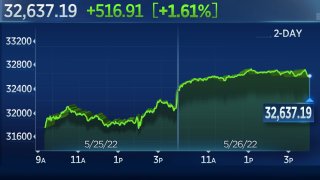
Dow Rises for a Fifth Straight Day, S&P 500 and Nasdaq on Pace to Snap 7-Week Losing Streaks
Stocks rose Thursday, putting Wall Street on track to break a long string of weekly declines.
The Dow rose for the fifth trading day in a row, adding 516.91 points, or 1.6%, to close at 32,637.19. The S&P 500 climbed about 2% to 4,057.84. The Nasdaq Composite advanced nearly 2.7% to 11,740.65, helped by a surge in Dollar Tree shares. The tech-focused index was the outperformer, after trailing the other averages earlier in the day.
The Dow has fallen the last eight weeks, while the S&P 500 and Nasdaq are riding seven-week losing streaks. The market seems to have somewhat regained its footing this week, however, as investors hope to see a peak in inflation and seek value at these levels.
Get top local stories in Connecticut delivered to you every morning. Sign up for NBC Connecticut's News Headlines newsletter.
The Dow and S&P 500 are up 4.4% and 4%, respectively, for the week. The Nasdaq is up 3.4%.
"Although this was an expected, and highly talked about potential 'oversold' rally, the underpinning for today's market climb higher, suggests that last week's doom and gloom about the all-important U.S. consumer may have been overdone, along with the dire recession headlines," said Quincy Krosby, chief equity strategist for LPL Financial.
"To be sure, the data releases this week suggest the economy is slowing, and the Fed appears poised to raise rates at a 50 basic point clip over the next two months," she added. "But the notion that the consumer, 70 percent of the U.S. economy, is on a spending strike, is overblown as earnings reports coupled with positive guidance indicate otherwise."
Money Report
Some remained distrustful of the rally as stocks have been on a persistent downward trend since the start of year, despite the relief bounces sprinkled throughout. Zachary Hill, head of portfolio strategy at Horizon Investments, told CNBC it's too early to shift focus from inflation to growth.
"We view this week's rally in equity markets as technical in nature and not a change in the overall trend," he said. "Tighter financial conditions suppressing demand in the real economy remain the channel through which the Fed hopes to cool inflation. Until that changes, rallies like we are seeing in equity markets this week, while somewhat expected after almost two months of relentless declines, are likely to be short-lived."
Shares moving on earnings
Stocks pushed higher after strong earnings from the retail sector gave a boost to investor sentiment. Macy's shares surged 19.3% after the company raised its 2022 profit outlook, and Williams-Sonoma rose 13% after beating estimates on the top and bottom lines.
Discount retailer Dollar Tree jumped about 21.9% after posting an earnings beat, which helped push the Nasdaq higher. Dollar General also reported strong earnings, adding 13.7% to its shares. The SPDR S&P Retail ETF gained more than 4%. Investors are looking forward to Costco's quarterly results, which it will report after the bell.
Shares of chipmaker Nvidia bounced after falling on weaker-than-expected guidance for the second quarter and a warning of a slowdown in hiring. Shares reversed and climbed 5.1% after a slew of analysts reiterated their buy ratings on the shares and highlighted momentum in the company's data center business.
A "glimmer of the return of deals" also helped lift investor sentiment, Krosby said. Specifically, chipmaker Broadcom announced plans to buy cloud company VMware in a $61 billion deal, which would be one of the biggest tech acquisitions of all time. Broadcom shares added about 3.6%, and VMWare rose nearly 3.2%.
"[It] suggests that value is being created as the market re-calibrates its valuation while the Federal Reserve raises interest rates and begins the taper of its balance sheet," Krosby said.
Elsewhere, Twitter shares jumped 6.3% after Elon Musk increased his commitment in his takeover bid to $33.5 billion, which analysts have said indicates a new seriousness and increased probability that he'll complete the deal.
On the flipside, software stock Snowflake pared steeper losses but was down 4.5% after the company's guidance for operating margin came in narrower than expected.
First-quarter gross domestic product declined at a 1.5% annual pace, worse than the 1.3% Dow Jones estimate and a writedown from the initially reported 1.4%, the Commerce Department reported Thursday.
Initial jobless claims for the week ended May 21 totaled 210,000, a decrease from the previous week's level of 218,000.
— CNBC's Jeff Cox contributed reporting.






